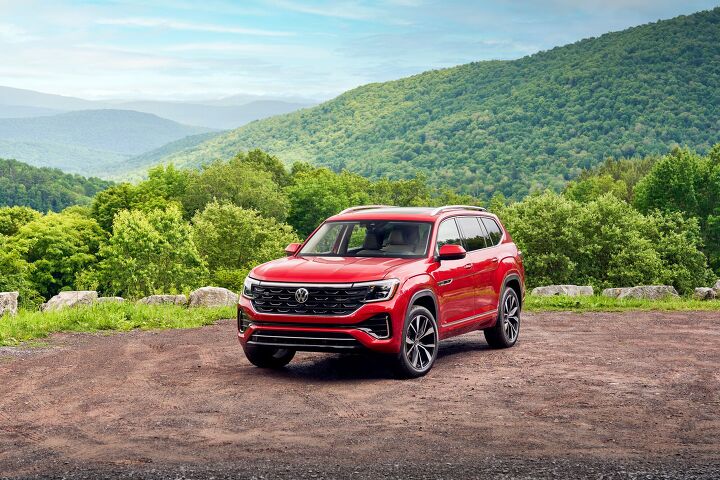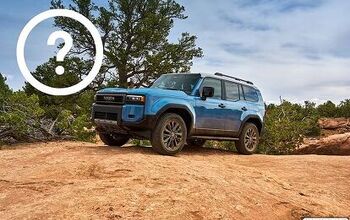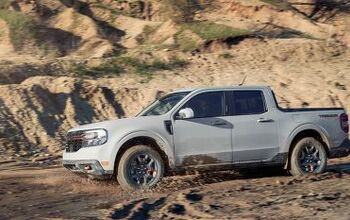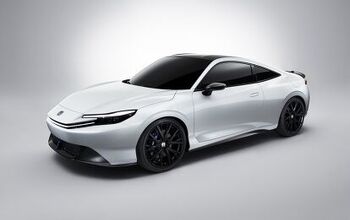2024 Volkswagen Atlas SEL Premium R-Line Review – Ready for the Road Trip

2024 Volkswagen Atlas SEL Premium R-Line Fast Facts
The more I review crossovers and utility vehicles, the more I evaluate them by how well they just simply work for commuting duty. With exceptions for performance and off-road versions. Those with luxury-brand badging and/or premium pricing get viewed through that prism.
This is, hopefully, a common-sense approach. Most of you readers may be enthusiasts, like I am, but these vehicles aren’t built for that. They are utilities before they are sporty. So that’s the way I look at it.
Viewed through that lens, the 2024 Volkswagen Atlas generally works well. And with some upscale feel, to boot.
As you might remember, the Atlas is refreshed for 2024, with minor exterior changes and somewhat more noticeable interior updates. As well as a change in terms of available powertrain options.
That change means there’s just engine now – a 2.0-liter turbocharged four-cylinder that’s a differently-tuned version of the EA888 found in the Golf R and GTI. Say goodbye to six-cylinder power.
You can still choose from front-wheel or all-wheel drive, and there’s still an eight-speed automatic transmission. This mill puts out 269 horsepower and 273 lb-ft of torque.
The exterior changes include an available grille-width light bar, new LED headlights, rear LED lighting with a body-wide light strip, and adaptive headlights are now standard.
Inside, VW leans more heavily into its much-maligned haptic-touch setup and has a wonky new shifter. The gauges are digital and customizable, there’s now a USB-C port for a dash cam and a center-console pass through, and the infotainment screen is meant to appear as if it floats.
Also now standard is Volkwagen’s IQ.Drive. This advanced-driver’s aid system includes active-side assist, lane assist, adaptive cruise control, front assist, and rear-traffic alert.
Oh, and some features you once had to pay more for are now standard. That includes a heated steering wheel, tri-zone automatic climate control, cooled front seats, voice control, and a passenger seat that’s height adjustable. You also don’t need to walk as far up the trim-level ladder to get heated rear seats and leather seats.
With more power than the previous four, the Atlas had plenty of grunt for most situations. As for handling, well, it exists – the steering is a bit too light though the Atlas proves agile enough relative to its size and mission.
The star here is the ride – it’s smooth. Long freeway jaunts passed with ease.
It’s also quiet. The Atlas’s selling point will be its highway manners. Smooth, quiet, comfortable. Makes for a good road-tripper.
The biggest demerit, unsurprisingly, is the haptic-touch. The system frustrates less than it has in earlier applications, but it still annoys at times. It also seems like an unnecessary sacrifice of usability that’s been traded for a cooler-looking design. I appreciate slick-looking cabins as much as anyone, but user experience matters more, generally speaking.
At least the change to awkward shifter is justified – it created the pass through. Though the thing can be a bit finicky. On the other hand, this could be one of those things that an owner gets used to. Us reviewers get a car for several days up to two weeks – owners have years to get used to their rides.
Most of the materials felt price-point appropriate, with a nice use of soft-touch and fake wood.
Volkswagen loaned me a top-trim SEL Premium R-Line, which came well-equipped with standard features such as 21-inch wheels, rear-zone climate control, fog lamps, rain-sensing wipers, power panoramic sunroof, R-Line interior bits (diamond stitching, stainless steel pedal covers), paddle shifters, three rows of USB ports, road-sign display, a 50/50 split-fold and fold-flat third row, rearview camera, post-collision braking, 360-degree camera, park-distance control, head-up display, keyless entry and starting, remote start, satellite radio, navigation, wireless smartphone mirroring, Harman Kardon audio, wireless device charger, and a hands-free power liftgate.
The only option was captain’s chairs for $695. The final tally? Almost $55K.
Premium price, yes, but you get what you pay for.
The Atlas has two big flaws, both baked in, and one more bothersome than the other. The first is that it’s boring. That’s expected, though, and unless you absolutely need head-turning looks, the ability to shred tires, or the potential to go way off pavement, there’s no problem with being plain when it comes to a family hauler. Boring is fine – especially if it means the entire package is easy to live with.
The bigger problem, the one that would make me pause if I was consider plunking down monthly payments on an Atlas, is the haptic-touch dominant interior. Haptic touch can work – see Mercedes-Benz and Jaguar/Land Rover for better adaptations of the tech – but VW has flubbed it across its lineup. Again, it was less of a hassle here than in other VWs, and you do start to get used to it over time, but it mars an otherwise well put together package.
Well, there's one other issue. The Atlas is a bit thirsty, at 19 mpg city, 25 mpg highway, and 21 mpg combined.
If you can live with occasional frustration from your controls, the Atlas is a superb road tripper and otherwise exceedingly competent crossover. It’s at least worth a long look.
[Images © 2024 Tim Healey/TTAC.com, Volkswagen]
Become a TTAC insider. Get the latest news, features, TTAC takes, and everything else that gets to the truth about cars first by subscribing to our newsletter.

Tim Healey grew up around the auto-parts business and has always had a love for cars — his parents joke his first word was “‘Vette”. Despite this, he wanted to pursue a career in sports writing but he ended up falling semi-accidentally into the automotive-journalism industry, first at Consumer Guide Automotive and later at Web2Carz.com. He also worked as an industry analyst at Mintel Group and freelanced for About.com, CarFax, Vehix.com, High Gear Media, Torque News, FutureCar.com, Cars.com, among others, and of course Vertical Scope sites such as AutoGuide.com, Off-Road.com, and HybridCars.com. He’s an urbanite and as such, doesn’t need a daily driver, but if he had one, it would be compact, sporty, and have a manual transmission.
More by Tim Healey
Latest Car Reviews
Read moreLatest Product Reviews
Read moreRecent Comments
- Peter Buying an EV from Toyota is like buying a Bible from Donald Trump. Don’t be surprised if some very important parts are left out.
- Sheila I have a 2016 Kia Sorento that just threw a rod out of the engine case. Filed a claim for new engine and was denied…..due to a loop hole that was included in the Class Action Engine Settlement so Hyundai and Kia would be able to deny a large percentage of cars with prematurely failed engines. It’s called the KSDS Improvement Campaign. Ever hear of such a thing? It’s not even a Recall, although they know these engines are very dangerous. As unknowing consumers load themselves and kids in them everyday. Are their any new Class Action Lawsuits that anyone knows of?
- Alan Well, it will take 30 years to fix Nissan up after the Renault Alliance reduced Nissan to a paltry mess.I think Nissan will eventually improve.
- Alan This will be overpriced for what it offers.I think the "Western" auto manufacturers rip off the consumer with the Thai and Chinese made vehicles.A Chinese made Model 3 in Australia is over $70k AUD(for 1995 $45k USD) which is far more expensive than a similar Chinesium EV of equal or better quality and loaded with goodies.Chinese pickups are $20k to $30k cheaper than Thai built pickups from Ford and the Japanese brands. Who's ripping who off?
- Alan Years ago Jack Baruth held a "competition" for a piece from the B&B on the oddest pickup story (or something like that). I think 5 people were awarded the prizes.I never received mine, something about being in Australia. If TTAC is global how do you offer prizes to those overseas or are we omitted on the sly from competing?In the end I lost significant respect for Baruth.








































Comments
Join the conversation
I like these, at least all the Atlas I've had as rentals. One had the VR6 and seemed slow and was definitely thirsty. The second was a 4 cylinder and just felt more responsive. Both were SE trim levels so not a great interior but serviceable for the intended mission. They're a generally boring drive, but just a touch better steering and handling than an equivalent Honda, Toyota, GM or Ford. My concern would be long term, does the VW electrics reputation creep up and cause problems and does that tuned 4 cylinder hold up in this porky and block truckette? Doesn't seem worth 55k to me, but lower trim versions are low 40s and probably an acceptable deal.
You neglected to mention that the 2024 Atlas has a US Government 5-Star Safety Rating.